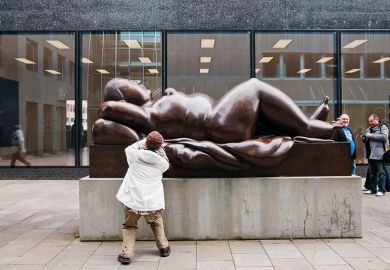In Liberty of Conscience, Martha C. Nussbaum argues that threats to religious liberty are not unique to the US, but that its response to these threats since its colonial days is unique and presents us with a model worth adopting elsewhere.
The US lacks an established state religion and, instead, has adopted a separation between state and religion, whereby the state shall not favour any religion over others. The Government must treat all religious views (including atheism) on equal terms with equal respect. Citizens then possess not only the liberty of their conscience to accept a particular religion without fear of state oppression, but they also have a liberty to express their conscience in their dress, worship and other ways within certain boundaries without fear of state oppression in these matters as well.
Thus, the separation of state and religion is, in fact, "a way of respecting human beings" and does not harm liberty of conscience and its expression. Only threats to public peace and safety - where the state has a clear interest in protecting its citizens - can legitimately limit the free exercise of our religious beliefs. Otherwise, we should accommodate religious differences.
Nussbaum traces the idea of accommodating religious differences on equal terms with equal respect back to the writings of Roger Williams, the founder of the Rhode Island Colony. This idea creates an American model that has developed since the country's colonial days and that can be found in the work of John Rawls.
For both Rawls and Williams (in Rawls's terminology), we can all live together on equal terms with equal respect no matter our differing "comprehensive doctrines" about religion and other matters provided that we form an "overlapping consensus" politically whereby we agree that no one comprehensive doctrine should dominate over others.
The American model demonstrates a genuine possibility of accommodating difference within an overlapping consensus where we honour and respect diverse beliefs about religion on equal terms without state oppression.
Nussbaum argues that other countries should adopt the American model because it reconciles religious difference with a respect for equality that is unparalleled, rather than because it is American: she defends a model that happens to be American and not because it is American.
Liberty of Conscience is wide ranging and covers an extraordinary amount of ground. It covers the wrongful attempts at suppressing the religious worship of any number of groups, including the Amish, Jehovah's Witnesses, Mormons, Native Americans, Roman Catholics and Seventh Day Adventists.
In addition, Nussbaum addresses a great variety of contemporary issues pertaining to the freedom of religious expression, such as evolution, the pledge of allegiance, public displays, religious dress, same-sex marriage and school prayer.
Throughout, we learn a great deal about the nature and arguments behind diverse beliefs and practices that itself is of immense value, but we also come to understand the fragility of equal respect in the face of difference: too often those in the majority become tempted to suppress the religious expression of minority religions whose members are regularly, but not exclusively, immigrants, working class, or both.
In virtually all cases, these attempts at state suppression are wrongfully oppressive in violating the equality between citizens with equal respect that is the hallmark of the American model. Nussbaum deftly and with great passion defends this model and its resilience over the years, offering a powerful argument for us all - in the US and beyond - to join together and to support this model.
Nussbaum's account is highly persuasive, although we may raise two concerns. First, while she clearly identifies an American model, her focus is primarily on religious expression in the US and more could be said about problems found elsewhere. Thus, we may be highly convinced by her account yet remain unclear about why the American model's handling of problems with religious expression is the most appropriate model for all other countries perhaps facing different challenges.
Second, one contemporary challenge to religious expression is found in calls for the imposition of Sharia in Western countries either alongside established legal systems or even as a replacement. This issue is surprisingly absent from Nussbaum's account. Instead, her discussion of Islam focuses on religious dress.
It would have been very helpful to know precisely how we should respond to those who do not accept that all forms of religious belief and worship should be treated equally, especially where these beliefs deny the separation of state and religion regarding this challenge.
Nevertheless, Nussbaum's Liberty of Conscience is a true tour de force on issues of pressing contemporary concern internationally, reaffirming her place as one of the most significant and thought-provoking public intellectuals today. Her book is a treasure trove of riches in both religious scholarship and philosophical argument that cannot be overlooked by anyone with an interest in the topic.
Liberty of Conscience: In Defense of America's Tradition of Religious Equality
By Martha C. Nussbaum
Basic Books
406pp, £16.99
ISBN 9780465051649
Published 6 March 2008
Register to continue
Why register?
- Registration is free and only takes a moment
- Once registered, you can read 3 articles a month
- Sign up for our newsletter
Subscribe
Or subscribe for unlimited access to:
- Unlimited access to news, views, insights & reviews
- Digital editions
- Digital access to THE’s university and college rankings analysis
Already registered or a current subscriber? Login



